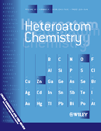
HETEROATOM CHEMISTRY
metrics 2024
Advancing Knowledge: The Future of Heteroatom Chemistry
Introduction
Heteroatom Chemistry is a prominent open-access journal dedicated to advancing the field of heteroatom chemistry, with a particular focus on the chemistry of elements other than carbon in organic compounds. Published by Wiley-Hindawi, this journal provides researchers, professionals, and students with a platform to disseminate and access novel research findings related to the synthesis, properties, and applications of heteroatom-containing compounds. Since its inception in 1990 and gaining open access status in 2019, the journal has fostered academic collaboration and innovation throughout its converged years, although it currently holds a category quartile ranking of Q4 in Chemistry (miscellaneous) and ranks #319 out of 408 in general chemistry within Scopus. With its commitment to high-quality research and broad accessibility, Heteroatom Chemistry is poised to be an essential resource for anyone looking to explore the rich and varied applications of heteroatom chemistry in diverse scientific fields.
Metrics 2024
 0.17
0.17 1.10
1.10 1.20
1.20 46
46Metrics History
Rank 2024
Scopus
IF (Web Of Science)
JCI (Web Of Science)
Quartile History
Similar Journals

Molbank
Advancing Molecular Insights for a Collaborative FutureMolbank is an open-access journal published by MDPI, dedicated to the fields of Biochemistry, Organic Chemistry, and Physical and Theoretical Chemistry. Established in 2002, this journal has served as a vital platform for the dissemination of research findings, where researchers and professionals share original articles focusing on molecular chemistry, synthesis, and related studies. With a commitment to open access, Molbank enables global access to scientific knowledge, fostering collaboration and innovation among scientists. While currently categorized in the fourth quartile for its field rankings, it provides a unique opportunity for emerging scholars to contribute to and engage with the scientific community. The journal is based in Switzerland, operating from its office at ST ALBAN-ANLAGE 66, CH-4052 BASEL, SWITZERLAND, and continues to attract submissions until 2024. Researchers, students, and professionals looking to expand their knowledge and participate in the dialogue of current molecular chemistry can benefit significantly from engaging with the content published in Molbank.

DOKLADY CHEMISTRY
Unveiling the latest breakthroughs in chemical research.DOKLADY CHEMISTRY is an esteemed academic journal published by MAIK NAUKA/INTERPERIODICA/SPRINGER, focusing on the dynamic field of chemistry. Established in 1996, this journal serves as a significant platform for disseminating cutting-edge research, reviews, and significant developments in various areas of chemistry, including but not limited to general and miscellaneous chemistry. Currently indexed with an ISSN of 0012-5008 and E-ISSN of 1608-3113, DOKLADY CHEMISTRY maintains a commitment to academic rigor and integrity, contributing critical insights to the scientific community. Despite its Q4 ranking in the 2023 Chemistry category and a Scopus rank of #314 out of 408, this journal remains an important resource for researchers, professionals, and students eager to explore emerging trends and innovative methodologies in the field. The journal operates under a model that supports comprehensive scholarly communication, making it a key fixture among established chemistry publications.
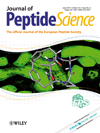
JOURNAL OF PEPTIDE SCIENCE
Unveiling the science behind peptides and their potential.JOURNAL OF PEPTIDE SCIENCE, published by Wiley, is a vital resource for researchers and professionals in the fields of biochemistry, drug discovery, and molecular biology. Established in 1995 and encompassing research through 2024, this journal provides a platform for disseminating cutting-edge studies related to peptide synthesis, structure, function, and applications in therapeutics. Although it currently does not offer open access, its robust content has earned it a respectable Q3 ranking in several categories, including biochemistry and pharmacology, according to the latest metrics. Researchers will find significant insights linked to peptide chemistry and its implications in medical sciences, making the JOURNAL OF PEPTIDE SCIENCE an essential addition to academic libraries and for those passionate about peptide research and its potential breakthroughs.

Chemical Methodologies
Connecting Scholars to Transform Chemical KnowledgeWelcome to Chemical Methodologies, a premier journal published by SAMI PUBLISHING CO-SPC, dedicated to advancing the field of chemistry through innovative research and methodologies. With an ISSN of 2645-7776 and an E-ISSN of 2588-4344, this journal provides a vital platform for researchers and scholars to share their findings in areas encompassing physical, theoretical, and organic chemistry. Despite its initial HIndex and quartile rankings still being established, the journal's evolving impact within the academic landscape is underscored by its Scopus Ranks, which place it in the 35th percentile for physical and theoretical chemistry and the 33rd percentile for organic chemistry. Since its inception in 2022, and continuing through 2024, Chemical Methodologies aims to foster collaboration and knowledge dissemination among academics and practitioners alike, bridging theoretical concepts and practical applications. This open-access platform enhances accessibility for researchers and students worldwide, ensuring that groundbreaking contributions to chemical science reach a broad audience.

INDIAN JOURNAL OF CHEMISTRY
Fostering a Community of Knowledge in the Chemical SciencesINDIAN JOURNAL OF CHEMISTRY, published by the NATL INST SCIENCE COMMUNICATION & POLICY RESEARCH (NIScPR), stands as a vital platform for disseminating innovative research and advancements in the fields of organic, inorganic, and physical chemistry. With its inception in 1969, this journal has served the global community of chemists and researchers, contributing significantly to the advancement of chemical sciences in India and beyond. The journal maintains a strong commitment to open access, facilitating widespread dissemination of knowledge, allowing readers from diverse backgrounds to access cutting-edge research without barriers. Although coverage in Scopus has been temporarily discontinued, the journal continues to uphold rigorous scholarly standards, making it an authoritative source for academicians, professionals, and students alike. Readers can expect high-quality articles that reflect the latest developments and discoveries in chemistry, reinforcing the journal's reputation as an essential resource in the scientific community.

RUSSIAN CHEMICAL BULLETIN
Empowering Chemical Inquiry and Discovery.RUSSIAN CHEMICAL BULLETIN, published by SPRINGER, serves as a pivotal resource in the field of general chemistry, covering a wide array of topics that impact both theoretical and applied chemistry. With an ISSN of 1066-5285 and a presence since 1993, this journal provides a platform for disseminating significant research findings, practical applications, and novel methodologies within the broader chemistry community. While it currently holds a Q3 ranking in the Chemistry (miscellaneous) category and occupies the 230th position out of 408 in the Scopus rankings, its reputation continues to grow, fostering collaboration and innovation among researchers and professionals alike. Although the journal does not offer an open-access model, it is committed to making findings accessible within the academic community, ensuring that valuable insights can inform future research. With an anticipated convergence of studies extending to 2024, the RUSSIAN CHEMICAL BULLETIN remains an essential reference for those dedicated to advancing chemical science.

CHEMISTRY OF NATURAL COMPOUNDS
Unveiling Nature's Secrets with Chemical PrecisionChemistry of Natural Compounds is a premier academic journal dedicated to the intersection of natural products and modern chemistry, published by Springer. Since its inception in 1965, this journal has published innovative research articles, reviews, and discussions that focus on the chemistry and biochemistry of natural compounds, with an emphasis on their applications in various fields including medicine, agriculture, and environmental science. Recognized for its contributions to the scientific community, the journal is indexed in key databases and holds a respectable impact factor that underscores its relevance in the academic landscape. Currently ranked in the Q3 category across multiple disciplines, including Biochemistry, Genetics and Molecular Biology, Chemistry, and Plant Science, it serves as a critical resource for researchers and professionals aiming to deepen their understanding of the complex interactions between natural compounds and biological systems. While not an open-access journal, Chemistry of Natural Compounds provides valuable insights and essential findings that can aid in advancing both theoretical and applied sciences for researchers, students, and industry practitioners alike.
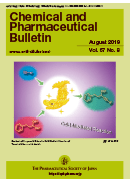
CHEMICAL & PHARMACEUTICAL BULLETIN
Innovating the future of medicine through research and insights.CHEMICAL & PHARMACEUTICAL BULLETIN, published by the Pharmaceutical Society of Japan, has been a cornerstone in the fields of chemistry, drug discovery, and medicine since its inception in 1958. With an ISSN of 0009-2363, this esteemed journal offers a platform for the dissemination of innovative research and critical insights contributing to these dynamic disciplines. Housed in Tokyo, Japan, it is strategically poised to bridge the gap between chemical sciences and pharmaceutical applications. Although the journal operates under a traditional subscription model and does not currently offer open access, it maintains a solid reputation, evidenced by its Q3 category rankings in multiple relevant fields and its percentile positions in Scopus, specifically 48th in General Chemistry and 30th in Drug Discovery. Researchers, professionals, and students alike will find invaluable resources within its pages, as it diligently covers shifting paradigms and emerging methodologies critical to advancing both theoretical understanding and practical applications in the pharmaceutical realm.
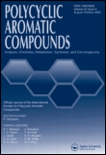
POLYCYCLIC AROMATIC COMPOUNDS
Advancing Knowledge in Aromatic ResearchPOLYCYCLIC AROMATIC COMPOUNDS, published by TAYLOR & FRANCIS LTD, is a pivotal journal dedicated to the study of polycyclic aromatic compounds, which play a significant role in fields spanning materials chemistry, organic chemistry, and polymers. With an ISSN of 1040-6638 and an E-ISSN of 1563-5333, this journal features a robust collection of research that informs and guides advancements in understanding the complex interactions and applications of these compounds. Having established its presence since 1990, POLYCYCLIC AROMATIC COMPOUNDS currently holds a Q3 ranking in multiple categories, including Materials Chemistry, Polymers and Plastics, and Organic Chemistry, showcasing its consistent contributions to scientific dialogues. Though traditionally not an open access journal, it provides immense value to researchers, professionals, and students seeking reliable and impactful studies. The journal is located in the United Kingdom at 2-4 PARK SQUARE, MILTON PARK, ABINGDON OR14 4RN, OXON, ENGLAND, and continues to be a trusted source for cutting-edge research in the field.
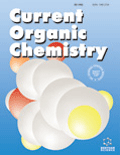
CURRENT ORGANIC CHEMISTRY
Transforming Ideas into Organic Chemistry BreakthroughsCURRENT ORGANIC CHEMISTRY, published by Bentham Science Publishers, stands as a pivotal platform in the field of organic chemistry, providing innovative insights and advancements since its inception in 1997. With an ISSN of 1385-2728 and an E-ISSN of 1875-5348, this esteemed journal has carved a niche in the academic landscape, currently ranking in the Q3 category for Organic Chemistry according to the 2023 metrics. Operating from the United Arab Emirates, it engages a diverse audience of researchers, professionals, and students by delivering quality peer-reviewed articles that cover a broad spectrum of organic chemistry research. Although the journal does not offer open access, it remains a respected source of knowledge, indexed in Scopus with a percentile ranking of 43, encouraging rigorous discourse and the dissemination of cutting-edge findings. With continuous publication through 2024, CURRENT ORGANIC CHEMISTRY is dedicated to advancing the frontiers of organic chemistry research and technology.